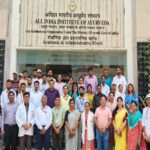Apart from other triggers, air pollution is a major cause of concern
New Delhi, November 27, 2018 :
Recent research has suggested that weight gain may be fueling the rise in childhood asthma. Obese youngsters may be more likely to develop the lung condition than children of a healthy weight. About 23% to 27% of new asthma cases could be directly attributable to obesity. Pediatric asthma is among the most prevalent childhood conditions and comes at a high cost to patients, families and the larger health system.
About 1 in 10 Indian children suffer from asthma, and lifestyle plays a large role in shaping the condition. In this condition, the lungs and airways become easily inflamed when exposed to certain triggers, such as airborne pollen or catching a cold or another respiratory infection. Children with asthma have difficulties in playing, studying, and other daily activities.
Speaking about this, Padma Shri Awardee, Dr KK Aggarwal, President, HCFI, said, “Asthma is usually triggered by allergens which inflame and constrict sensitive (hyper allergic) airways, making it difficult to breathe. The airways may become sensitive due to the immune system’s threat perception. An asthma attack occurs when an allergen or a stress factor causes an immune reaction that leads to inflammation (swelling) in the airways, narrowing the air passage and reducing air flow in the lungs. Children with this condition are likely to face difficulties unless precautions are taken. Given the current levels of air pollution in Delhi, it is imperative to prevent the onset of this condition in children. With an already weaker immune system, they may be more prone.”
Symptoms of asthma in children include frequent, intermittent coughing; whistling or wheezing sound when exhaling; shortness of breath; chest congestion and tightness; and chest pain, particularly in younger children.
Adding further, Dr Aggarwal, who is also the Group Editor-in-Chief of IJCP, said, “It may not be prudent to expect young children to understand the chronic nature of asthma or how it can affect them. Educating parents is thus the key here. They should be well-informed about the condition and understand what is to be done in case of any emergency.”
Some tips from HCFI
- Be proactive in helping your child avoid the allergens and irritants that trigger asthma symptoms.
- Don’t allow smoking around your child. Exposure to tobacco smoke during infancy is a strong risk factor for childhood asthma, as well as a common trigger of asthma attacks.
- Encourage your child to be active. As long as your child’s asthma is well controlled, regular physical activity can condition the lungs to work more efficiently.
- See the doctor when necessary. Check in on a regular basis. Don’t ignore signs that your child’s asthma may not be under control, such as needing to use a quick-relief inhaler too often. Asthma changes over time. Consulting your child’s doctor can help you make any needed treatment adjustments to keep symptoms under control.







